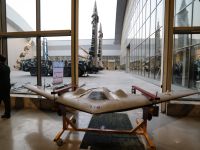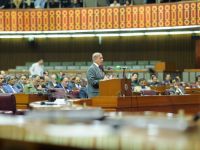North Korea on Sunday made a new appeal for closer ties with the European Union, even though EU countries that announced they would seek diplomatic relations are now warning it could be a long process.
A commentary in the Rodong Sinmun newspaper of the ruling Workers' Party said opening relations with EU nations would help guarantee "peace and security in Northeast Asia and the rest of the world."
Britain, Germany and Spain announced last month they would push for official ties, and the state newspaper's commentary said North Korea "highly estimates the willingness of different countries of the European Union to establish and develop friendly relations with it as a positive development."
The newspaper, quoted by the official Korean Central News Agency (KCNA), said the absence of relations with EU nations was "abnormal."
It went on: "During the Cold War not a few countries took a cautious and hostile attitude toward (North Korea) as they lacked correct understanding of it."
The Workers Party newspaper added that the ruling party and government had always wanted "good-neighborly and friendly relations with those capitalist countries that respect its sovereignty and are friendly to it."
Delegations from the German and EU parliaments visited Pyongyang last week to discuss closer ties.
Italy made a surprise move in March to establish relations with the North. But the moves by Britain, Germany and Spain highlighted apparent EU divisions on dealing with the North, which has sought greater international contacts since a historic summit in June between the leaders of the rival North and South.
France distanced itself from the rush with President Jacques Chirac saying North Korea must make more progress on human rights and in other areas.
Former European Commission president Jacques Santer, who led the EU delegation to Pyongyang, urged greater European coordination in developing relations with North Korea following a five-day visit.
Speaking in Beijing on Saturday, Santer said EU deputies had urged North Korean officials to open a human rights dialogue with Europe and also raised missile concerns and Europe's contribution to an international consortium building new nuclear reactors for the North.
Santer said the delegation held "open-minded and constructive talks" with officials including nominal head-of-state Kim Yong-Nam, Foreign Minister Paek Nam-Sun and Ryo Chun-Sok, vice defense minister.
But the North had been non-committal about rights, Santer told reporters. Pyongyang is normally highly sensitive to criticism of its human rights record.
Hans-Ulrich Klose and Antje Vollmer, members of the German parliament who also returned from North Korea on Saturday, urged the German government not to hurry plans to establish diplomatic relations.
"We must be clear on the German side what exactly our interests are in establishing diplomatic relations with North Korea," Klose told journalists.
Speaking in Seoul last week, Germany's Foreign Minister Joschka Fischer also took a more hesitant stance toward any formal establishment of relations.
He said the Berlin government would have more talks after the parliamentary delegation's return from Pyongyang.
"There will have to be talks with our European partners and then we will have to finalize negotiating details within the German government," Fischka said.
A senior British diplomat also said that no agreement could be expected "in the next few months" -- SEOUL (AFP)
© 2000 Al Bawaba (www.albawaba.com)







